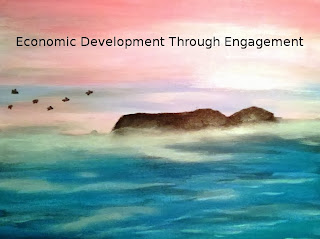Culture and economics not often something that are
seen together as its smacks of elitism. However, culture as a belief system has
a noticeable impact on societal behavior and the everyday choices people make
that contribute to economic development. A paper by Svetlana Overbaugh,
indicates that culture should be a major consideration in the determination of
countries that are ripe for international investment and growth (2013).
Falling trade barriers, communication improvements,
and shipping improvements have opened the markets to major change. Those
nations that are likely to succeed have the right culture and infrastructure to
capitalize on this change. As Asian countries zoom ahead in growth, Americans
and Western European nations continue to lose market share. The time for
regeneration based upon basic cultural principles may be needed to reclaim the
marketplace.
The degree of economic freedom and the pace of a
country’s growth influence its economic competitiveness (Johnson &
Lenartowicz, 1998). The Organization on Economic Cooperation and Development
(OECD) defines global competitiveness as the ability of a country to produce
new products that can successfully compete against other countries in the
global marketplace (2011). Economic growth becomes a process of turning out the
new and unique.
If we travel back in time we can find that Adam
Smith (1776) believed that self-interested actions of many market participants
leads to efficient allocation of resources that can result in higher
productivity and economic growth. Other ancient theorists such as Tucker
believed that countries become rich due to the desire to develop new knowledge,
learn, and apply this knowledge in new ways (1776). Thus, economic development
is rooted in the cultural underpinnings that afford opportunities to develop
new knowledge and use that knowledge to enhance international sales and profits.
The author relied on Hofstede’s Cultural Dimensions Model and economic activity to determine competitiveness. The six cultural dimensions of power distance,
individualism/collectivism, masculinity/ femininity, short/long-term thinking,
and indulgence/restraint were part of the evaluation process. They are
important because once the cultural underpinnings have been established they
reinforce social rules and norms on society.
Even though the study focused on smaller
post-communist countries, they also offer a glimpse into why some countries are
growing and why some are not and this has broad implications. The Author found
that since national culture impacts every aspect of social life it is necessary
to foster innovativeness and human development within that culture to foster
economic activity. It is the choices of many that make a viable system.
The author found that two cultural attributes of
power distance and uncertainty avoidance have the greatest influence on growth.
When power-distance relationships are low all members of society are encouraged
to work and grow while low uncertainty avoidance encourages a higher entrepreneurship
stance that takes chances on new products and services. Growth is through
egalitarian and supportive risk-taking perspectives.
Beyond this report, we can see that those cultures
that influence norms on productive innovativeness and human development also see
higher levels of GNP development. These cultural attributes are based in the
way people think about their place in the economic system. Through maximum
engagement of all members of society in the self-enhancement, of their personal
lives and their economic spirit of creation, the system can transform itself to
a high product and service development society that reaps the rewards of
international competition. Culture must
engage, encourage, and reward individuals or those who can offer the most are stifled
under poor reinforcing economic structures that lead to a path of decline for a
nation and its people. The best and
brightest must rise if there is to be hope for a better future. Is it what
you know or who you know that filters
its way into your decision-making process and management decisions?
Hofstede, G. H. (2001). Culture's
consequences: Comparing values, behaviors, institutions, and
organizations across nations (2
ed.). Thousand Oaks, CA: Sage.
Johnson, J. P., &
Lenartowicz, T. (1998). Culture, freedom and economic growth: Do cultural
values explain economic growth? Journal of World
Business, 33(4), 332-356.
OECD. (2011).
Retrieved ft-om OECD:
Overbaugh, S. (2013). National culture, country-level
competitiveness, and economic development. International Journal of Business
and Economics Perspectives, 8 (1).
